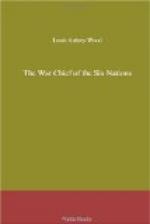But the giant pine-tree of the forest was now beginning to bend. Tall and erect, it had out-topped and outrivalled every other tree of the woodland. Men knew that that pine-tree was tottering. In the autumn of 1807 the Captain of the Six Nations was in the grip of a serious illness. Friends and neighbours came to bring solace and comfort, for he was widely revered. Racked with pain, but uncomplaining, he passed the few weary hours of life which were left. On November 24, 1807, the long trail came to an end. Close by Brant’s bedside. John Norton, [Footnote: Norton was a Scotsman who, coming to Canada early in life, settled among the Mohawks and won a chief’s rank among them. He played an important part in the War of 1812.] a chieftain of his tribe, leaned to catch the last faltering word.
‘Have pity on the poor Indians,’ whispered the dying War Chief; ’if you can get any influence with the great, endeavour to do them all the good you can.’
The body of Captain Brant was taken to Grand River and buried beside the walls of the church he had helped to rear. In the centre of the busy city of Brantford—whose name, as well as that of the county, commemorates his —stands a beautiful monument, picturesque and massive, to his worth and valour; in the hearts of the people of Canada he is enshrined as a loyal subject, a man of noble action, and a dauntless hero. Seldom in the annals of Canada do we find a character so many-sided as the Captain of the Mohawks. He was a child of nature, and she endowed him with many gifts—a stout and hardy frame, a deportment pleasing and attractive, and an eloquent tongue. It was these natural endowments that gave him endurance in the conflict, pre-eminence in council, and that won for him the admiration of his contemporaries.
The education which Brant received was meagre, but he could hardly have put what knowledge he had to better advantage. After he had been relieved from the arduous life of the camp, he began to satisfy again his desires for self-culture. His correspondence towards the close of his life shows a marked improvement in style over that of his earlier years. There is no lack of convincing evidence that Brant had a penetrating and well-balanced intellect; but his chief glory is the constant efforts he put forth for the moral and religious uplift of his people.
With respect to Brant’s abilities as a military leader, there will continue to exist differences of opinion. That he possessed the craftiness of his race in a superlative degree, and that he used this to baffle his opponents on the field of battle, cannot be denied. Some will go further and assert that he had a remarkable genius in the art of stratagem. Whatever powers he had he used, from his boyhood days, in the interests of British rule in America, and the services rendered by this last great leader of the Six Nations in the War of the Revolution were not among the least of the influences that enabled Great Britain to maintain a foothold on the North American continent. Joseph Brant in the War of the Revolution and his descendants in the War of 1812 played essential parts in firmly basing British institutions and British rule in Canada.




